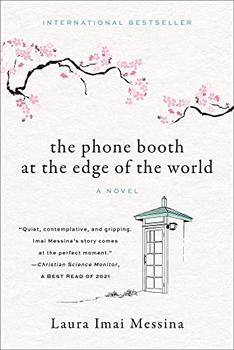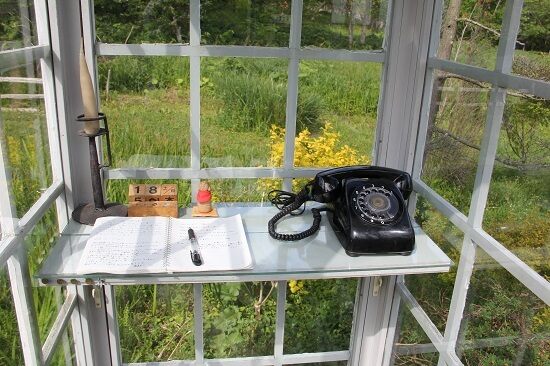Summary | Excerpt | Reading Guide | Reviews | Beyond the Book | Read-Alikes | Genres & Themes | Author Bio

Critics' Opinion:
Readers' Opinion:
First Published:
Mar 2021, 416 pages
Paperback:
Oct 2022, 416 pages
 Book Reviewed by:
Book Reviewed by:
BookBrowse First Impression Reviewers
Buy This Book
This article relates to The Phone Booth at the Edge of the World
 In The Phone Booth at the Edge of the World, author Laura Imai Messina crafts a fictional story around a real-life place of public mourning, a phone booth, in the Japanese town of Otsuchi, located about three hours inland in northeastern Japan. A man named Itaru Sasaki built the glass booth with a rotary phone inside after the death of a cousin in 2010. He imagined he could use the phone to call his cousin and it became a means of coping with his grief. Not long after Sasaki's personal loss, tragedy struck on a grander scale when a massive earthquake and tsunami hit Japan's northeast coast on March 11, 2011, killing over 15,000 people. In the aftermath, Sasaki opened his phone booth to the public as a place of grieving. It's estimated that 10,000 people visited the booth in the following three years.
In The Phone Booth at the Edge of the World, author Laura Imai Messina crafts a fictional story around a real-life place of public mourning, a phone booth, in the Japanese town of Otsuchi, located about three hours inland in northeastern Japan. A man named Itaru Sasaki built the glass booth with a rotary phone inside after the death of a cousin in 2010. He imagined he could use the phone to call his cousin and it became a means of coping with his grief. Not long after Sasaki's personal loss, tragedy struck on a grander scale when a massive earthquake and tsunami hit Japan's northeast coast on March 11, 2011, killing over 15,000 people. In the aftermath, Sasaki opened his phone booth to the public as a place of grieving. It's estimated that 10,000 people visited the booth in the following three years.
After a tragedy like the tsunami, there is often an outpouring of public mourning, and later, perhaps a memorial is constructed for the purpose of giving people a space to grieve — the National September 11 Memorial and Museum in New York, for example. On a smaller scale, it's common for friends and family to gather at the spot where a loved one was killed in an automobile accident, perhaps to hold a small vigil with candles and flowers, publicly sharing their grief with one another.
 Not all grieving spaces memorialize a specific event or source of suffering. In the German city of Mainz, the Trauerort — "Place of Mourning" — is located on the grounds of a Catholic church. It features two semi-circle stone benches (designed to symbolize "a soul held by two arms") where visitors can sit and grieve their losses, whatever they may be. Though the space is open to anyone, the team that designed it hoped to provide a place where refugees could spend time contemplating their grief and trauma. A plaque on the spot features the inscription: "A Place to Mourn: For all those who cannot visit the graves of their beloved dead. For all who have moved here from far away, for refugees and migrants. For all people, of all religions, cultures, and languages."
Not all grieving spaces memorialize a specific event or source of suffering. In the German city of Mainz, the Trauerort — "Place of Mourning" — is located on the grounds of a Catholic church. It features two semi-circle stone benches (designed to symbolize "a soul held by two arms") where visitors can sit and grieve their losses, whatever they may be. Though the space is open to anyone, the team that designed it hoped to provide a place where refugees could spend time contemplating their grief and trauma. A plaque on the spot features the inscription: "A Place to Mourn: For all those who cannot visit the graves of their beloved dead. For all who have moved here from far away, for refugees and migrants. For all people, of all religions, cultures, and languages."
As a student in New York City, Heesun Kim designed a "grief space" as an art installation. It featured three booths with a tree in the middle, and visitors were encouraged to write down their wishes on paper that could be attached to the tree. When she went on to pursue her PhD in integrative therapy at the Pacifica Graduate Institute in California, Kim returned to this notion and turned a large mulberry on campus into a Grieving Tree, giving her fellow students who had experienced loss a peaceful place of solace to visit.
For some, the simple act of traveling may be a comfort in the aftermath of a loved one's death. Author and California therapist Claire Bidwell Smith suffered the loss of both parents from cancer when she was a young adult, and in an essay written for Psychology Today, she explains how traveling through Europe helped her cope: "No matter your emotional state, traveling always provides an insightful vantage point into your life, but when you're grieving, that vantage point often widens into something much more. Grief is an isolating experience. It's lonely and quiet, and it's easy to sink into. Reminding yourself that there is a whole world out there still turning on its axis can be vital."
Itaru Sasaki's phone booth in Otsuchi, courtesy of Atlas Obscura
Mainz Place of Mourning, courtesy of Caritas Mainz
Filed under Cultural Curiosities
![]() This "beyond the book article" relates to The Phone Booth at the Edge of the World. It originally ran in March 2021 and has been updated for the
October 2022 paperback edition.
Go to magazine.
This "beyond the book article" relates to The Phone Booth at the Edge of the World. It originally ran in March 2021 and has been updated for the
October 2022 paperback edition.
Go to magazine.




Common sense is genius dressed in its working clothes.
Click Here to find out who said this, as well as discovering other famous literary quotes!
Your guide toexceptional books
BookBrowse seeks out and recommends the best in contemporary fiction and nonfiction—books that not only engage and entertain but also deepen our understanding of ourselves and the world around us.